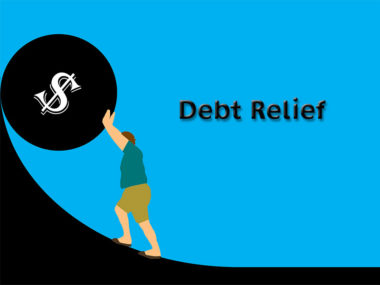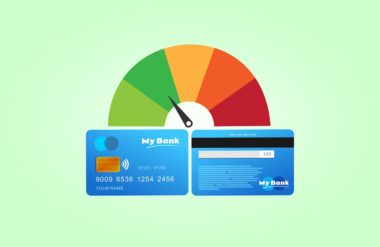When it comes to the debt “game,” there is no black and white answer.
Some people will always see debt as a figurative monster, ready to swallow up all your savings (and you) and throw your life into chaos. Yet others see it as a necessity or a means to an end: you have to leverage yourself a little before you can get anywhere in life. Then there are those that are reckless and rack up their debt freely and without restraints.
Well, you certainly don’t want to be in that last group.
But figuring out the “debt game” can be tricky. It really boils down to a balancing act: do you make enough to both save up and pay off your debts? Can you take on more debt without burying yourself in monthly payments?
There’s certainly no reason why you should swear off debt entirely, but you will certainly need to keep control of it. Here is some advice to help you determine when your debt has reached the “too much debt” threshold.
Table of Contents
Warning Signs
When you are factoring together your debts, or considering an addition to what you already have, there are some general warning signs you should consider.
For one, how long will it take you to repay off all your loans? And if you only pay the minimum payment each month, how much extra will you have to pay over time? Due to your interest rate, paying off your debts over time normally means you are paying off more than you borrowed in the first place.
Many credit card statements might break down this difference for you: how if you pay the minimum, you’ll pay “x” amount extra based on your interest rate. That extra amount will decrease if you increase how much you pay off each month.
However, there are some toxic forms of debt that everyone should avoid, including payday loans, loans without a credit check, and those that charge you double what you asked to borrow. Although that “fast cash” scheme might seem promising, it’s an easy way to fall into a massive debt trap.
In general, you will want to make sure that any money you borrow is money you can afford to pay back, and then some. But paying back double (or triple, or more) of what you borrowed in the first place is simply throwing away your hard-earned money. Always be cautious of how much money you are borrowing, and who you are borrowing it from.
The 50/30/20 Guideline
One bit of financial advice that could really help when trying to manage your debt is the 50/30/20 guideline. This concept was created by Elizabeth Warren (yes, the Senator, but before she was a senator) and her daughter, Amelia Warren Tyagi, in their book All Your Worth. This guideline can not only help you figure out your debts, but is useful for budgeting as well!
It works like this: Warren and Warren Tyagi suggest estimating your after-tax income and dividing it in a specific way. Save 50 percent of your income for personal needs — such as food, clothing, children, loan minimum payments, and basic needs — and split the other half into 30 percent for “wants” (vacation and entertainment, for example) and 20 percent for saving and paying off debts.
Here’s an example:
- Total income after taxes: $45k/year
- 50 percent of income for basic needs = $22,500
- 30 percent of income for “wants” = $13,500
- 20 percent of income for saving and paying off debts = $9,000
To help you stay true to the guideline, try not to create debt that overflows that 20 percent barrier when you make your monthly payments. If you’re spending almost half of your monthly income on paying off your debts, you might be in a tight spot. If you’re spending only 10 percent or less of your monthly income on debt reimbursement, then you might be in good shape t to get a new car loan or refinance your home.
As long as your income is steady and your debts don’t exceed that 20 percent marker, you should be in total control of your finances.
Different Debts, Different Monsters
Not all debts are the same, and some are certainly worse than others. It is especially important when considering your debt to separate out the types of debt you’re paying off.
For example, auto loans tend to be fixed-rate loans over a series of years. However, that $32,000 car you bought in 2015 isn’t going to be worth $32,000 when you’re done paying it off. It is a depreciating asset, and you will need to consider both the length of time it will take to pay it off, and how much extra you’re going to be putting into a purchase that is losing value every second. In this way, try not to buy a car loan that exceeds 5-10 percent of your income, and try to put a down payment on your car when possible (typically around 20 percent of the total price) to avoid spending more in the long run.
Real estate loans, on the other hand, can allow you to earn equity over the life of the loan. If you play your cards right and upkeep the house, it will increase in value over time. Still, the housing market is constantly in flux, and the price of your home can change regularly.
In the past, it might have been recommended to spend 30 percent of your income on housing payments, but in our current market that could be ill advised. Instead, try not to spend more than 25 percent of your monthly income on mortgage payments. Also, make sure your home will be paid off before you retire. Fixed retirement incomes and mortgage payments do not mix well, and the last thing you want is to be strapped down with a 30-year loan when you’re 10 years away from retiring.
Credit card debt can be its own unique challenge. Not only are they great for building up your credit score, but they can easily get out of hand if you are too liberal with your spending. If you’re really trying to buckle down on your debts, try to pay double your minimum payment each month. This will help you pay them off fast, and prevent interest from burdening you with even more debt.
No Reason to Fear
Playing the debt game can be tricky. One moment you can be floating along just fine, and then the next you find yourself floundering in high payments and long repayment plans.
However, there is no reason to fear debt, and if you are struggling to get your debt under control there are professionals out there that can help you. Both bankruptcy attorneys and debt consolidation services are available for those that are floundering, and they can help you get your life and finances back in line.
Don’t allow debt to rule your life, but don’t swear it off entirely, either. If you can find a way to balance your income with your debts, and still save up, then you’re on the right track to financial stability.
Need more information on how debt affects your credit score? Visit our credit score learning center. Are there debts on your credit report that are not yours? Visit our letter template resource center to learn how to dispute the entries.





